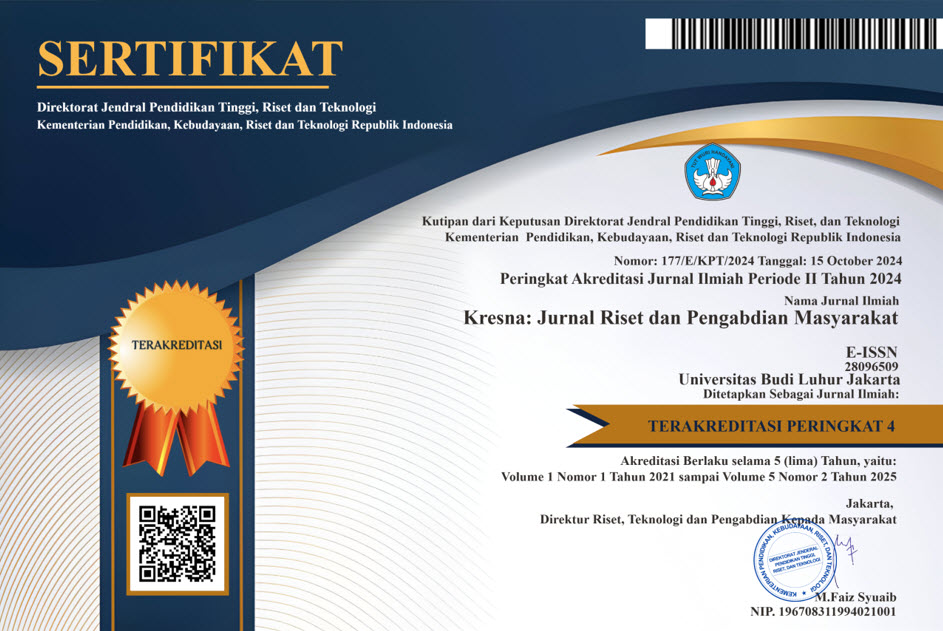Pengukuran Kesiapan Pembelajaran Daring di Tengah Pandemi COVID-19: Studi Kasus Universitas Budi Luhur
Measurement of E-Learning Readiness during the COVID-19 Pandemic: A Case Study of Universitas Budi Luhur
DOI:
https://doi.org/10.36080/jk.v1i1.9Keywords:
e-learning, model, readinessAbstract
The world is currently experiencing a big issue since the World Health Organization (WHO) announced the global pandemic status of Corona Virus Disease 2019 (COVID-19). To prevent the spread of COVID-19, university leaders must choose to disable lecture activities in the campus environment and enforce online learning for students. E-learning is one type of learning that utilizes information and communication technology then it can be accessed by students anytime and anywhere. Universitas Budi Luhur has implemented e-learning since 2019, but there is still unpreparedness in its implementation. It is necessary to measure quantitatively to determine the level of e-learning readiness of Universitas Budi Luhur. E-learning readiness level measured based on the e-learning readiness model used. Data collection uses questionnaires and interviews, while data processing uses descriptive statistical techniques. The results show that the Universitas Budi Luhur e-learning readiness index is at a ready level yet only needs improvement in implementing it.
Keywords : e-learning, model, readiness
Downloads
References
Mungania, Penina, “The Seven E-Learning Barriers Facing Employees. Research Final Report of the Masie Center of E-Learning Consortium”, University of Louisville, 2003.
Borotis, Spiros, Poulymenkou, Angeliki, and Rosenberg, M.J, “E-learning Readiness Components: Key Issues to Consider Before Adopting E-Learning Interventions”, Digital Age: McGrawHill, 2004.
Chapnick, Samantha, “Are You Ready for E-Learning?”, ResearchDog, 2000.
Aydin, Cengiz Hakan and Tasci, Deniz, “Measuring Readiness for e-Learning: Reflections from an Emerging Country”, Educational Technology & Society, vol. 8, no. 4, pp. 244-257, 2005.
Saekow, Apitep and Samson, Dolly, “E-learning Readiness of Thailand’s Universities Comparing to the USA’s Cases”, International Journal of e-Education, e-Business, e-Management and e-Learning, vol. 1, no. 2, pp. 126-131, 2011.
Azimi, Hamid Mohammad, “Readiness for Implementation of E-Learning in Colleges of Education”, Journal of Novel Applied Sciences, vo. 2, no. 12, pp. 769-775, 2013.
Fariani, Rida Indah, “Pengukuran Tingkat Kesiapan E-Learning (E-Learning Readiness)”, Prosiding Seminar Nasional Aplikasi Teknologi Informasi (SNATI), pp. 1-7, 2013.
Oketch, Hada Achieng, Njihia, J. M., and Wausi, A. N, “E-Learning Readiness Assessment Model In Kenyas’ Higher Education Institutions: A Case Study Of University Of Nairobi”, International Journal of Scientific Knowledge, vol. 5, no. 6, pp. 29-41, 2014.
Faslah, Rony and Santoso, Harry Budi, “Analisis Kesiapan Implementasi E-Learning
Menggunakan E-Learning Readiness Model”, Jurnal Positif, vol.3, no. 2, pp. 113-120, 2017.
Rohayani, Hetty, Kurniabudi, and Sharipuddin, “A Literature Review: Readiness Factors to Measuring E-Learning Readiness in Higher Education”, Prosiding International Conference on Computer Science and Computational Intelligence, vol. 59, pp. 230-234, 2015.
Pusparini, Ketut Sri, Santosa, Made Hery, and Myartawan, I.P.N. Wage, “An Investigation on Teachers’ E-Learning Readiness toward E-Learning Implementation in Public Senior High Schools”, Jurnal Pendidikan Bahasa Inggris Undiksha, vol.5, no. 2, 2017.
Rosenberg, Marc J., “The E-Learning Readiness Survey”, New York, 2000.
Williams, Vicki, “Online Readiness Questionnaire”, Penn State University, Tersedia: http://tutorials.istudy.psu.edu/learningonline/ORQ/ORQ.htm [Diakses: 30 Desember 2020].








 Kirim email ditujukan ke
Kirim email ditujukan ke 
